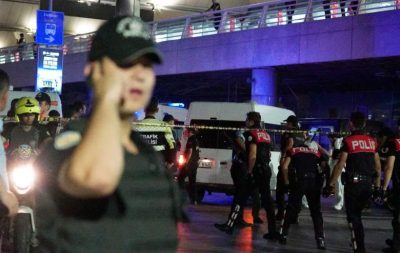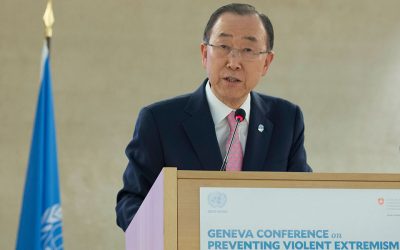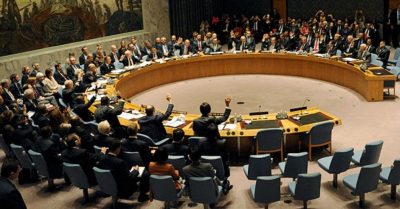Getty image
By
Durodola Tosin
The international system is evolving; the structures that exist are either in decline or not meeting with the demands of global peace and security. The international system has gone through such a rapid transformation to the extent that the UN structures, as they were at the time of its establishment, are not making the UN function as effectively as expected by the majority of its membership.
To tackle terrorism on a global scale, nation states’ conception of terrorism must change. Existing structures and international organizations must be reformed.
We are going through a challenging time in maintaining global peace and security. Recent widespread terrorist attacks and violent events in various parts of the world has given any sane analyst no choice but to question the attitude of nation states and the efforts of the United Nations towards this horrendous situation.
It is so perplex that many nation states have politicised various efforts to address this issue of terrorism. Do they still think that the recent act of terrorism is not a war? If they still live in that vague belief, they are miles away from achieving peace and security.
It is a fact that the recent terrorist attacks have proven that this is another dimension of war. Yes, it doesn’t involve two or more Nations fighting one another but it is all about creating an unfavourable and unliveable atmosphere for the people of the world by bombing and shooting at various centres.
The United Nations that is charged towards maintenance of international peace and security has failed in its responsibilities and duties. Many may tend to disagree with my view, they may contend that since 1948, the UN has ended conflicts and fostered reconciliation by conducting successful peacekeeping operations in dozens of countries, including Cambodia, El Salvador, Guatemala, Mozambique, Namibia and Tajikistan.
They may argue that the UN peacekeeping has also made a real difference in other places such as Sierra Leone, Burundi, Côte d’Ivoire, Timor-Leste, Liberia, Haiti and Kosovo. They will say that by “providing basic security guarantees” and “responding to crises”, these UN operations have supported political transitions and helped buttress fragile new state institutions. They have helped countries to close the chapter of conflict and open a path to “normal development”.
But the question remains, how has the United Nations responded to the recent acts of terrorism? What has been the attitude of the United Nations towards this new dimension of war? How has the United Nations performed in the war against terrorism? How many lives have been lost during this horrible situation?
Various analysts and writers can keep praising the United Nations for its “Success” but the truth will also prevail. The United Nations have been caught off guard and the recent surge in terrorist attacks has revealed its failings.
Ban Ki-moon – Jean-Marc Ferré/UN photo
The United Nations Security Council, the principal organ responsible for maintaining international peace and security, has been faced with criticism since its establishment in 1946. Critics and politicians alike have criticised this Council for its small size and exclusive nature, its relations with the General Assembly, its working methods, and undemocratic structure.
There has been a clamour for the reform of the UN Security Council since 1958 with various countries agitating that the council should be representative of each region. The issue of the Security Council reform is one of the perennial debates that has been discussed for at least 20 years; some people like Sahar Okhovat even say this issue is as old as the Council itself. Due to the flaws of the UN Security Council, different debates and proposals on the reform of the Council have emerged. Non-aligned Movement, Uniting for Consensus, G4 and other groups tabled their proposals for the reform, stating the way the Permanent and non-permanent seat should be organized.
What was the response of the United Nations? They set up a High Level panel to produce a proposal for the reform of the Security Council. The High Level Panel on Threats, Challenges and Change produced a report in December 2004 in which they said that the Security Council decisions often “lacked realism, equity and consistency, resulting in inadequate follow-up and implementation by the UN’s membership as a whole”. Ironically, like the member states, the Panel also could not agree on a single formula. The Panel proposed two models: Model A and Model B.
UN Security Council – Reuters photo
Since the establishment of the Security Council, permanent members have used their power of veto in accordance with their national interests. The use of that power rapidly distanced from the initial reason for which it was included in the UN Charter, namely preventing the UN from taking direct action against any of its principal founding members. The quest by the P5 (Permanent Five) to retain the veto power for themselves has done more harm than good. Such mentality has only worsened the situation. They call themselves promoter of peace but continue to export arms on a global scale. We cannot be exporter of arms and nuclear weapons, and at the same time, exporter peace.
As long as the veto power remains with the P5, the decision process of the United Nations will either be slow or biased because the Security Council is not a representative of all regions. Veto power is one of the biggest flaws of the Security Council and the main factor that has rendered this body undemocratic. Lack of transparency of the Council, many of its working methods and to some extent its agenda have all been criticised since its establishment and have led to strong calls for reform. Many countries are critical of the agenda of the Council because they believe the conflicts in Europe, Africa and the Middle East are more likely to appear in the agenda than the conflicts in Asia and South America.
The international system is evolving and changing but the P5 refuse to agree and various continents remain divided on which reform proposal to support. Any fundamental reform, such as any changes to the number of the Security Council seats, has to be inscribed into the Charter. On the other hand, Articles 108 and 109 of the UN Charter give veto power to the P5 over any amendment to the Charter. Therefore, no reform can materialise without the consent of the permanent members.
Recently, there have been series of attacks in various countries like France, America, Nigeria and even Turkey which have led to the loss of several lives and properties.
We can only reduce this “new dimension of war” by accepting structural reform and changing our perception of terrorism.
I DEDICATE THIS PIECE TO THOSE WHO HAVE LOST THEIR LIVES DURING THIS “NEW DIMENSION OF WAR” IN AFRICA, AMERICA, EUROPE, ASIA AND OF COURSE THIS WEEK IN ISTANBUL, TURKEY.





No Comments Yet!
You can be first to comment this post!